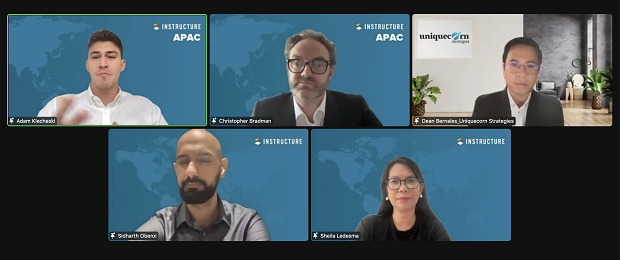Edutech company Instructure, the maker of the Canvas learning management system (LMS) used by top schools in the Philippines, held an online press briefing last Nov.17 to discuss the future of education in the country.

The Canvas LMS is a Web-based platform that universities, educators, and students around the world have employed to centralize the access and management of course learning materials and course communication.
Canvas has been used by Philippine schools since 2017. With the digital shift during the pandemic, however, more schools such as the University of the Philippines, Ateneo de Manila University, and De La Salle University adopted it streamline their transition to online learning.
As pandemic restrictions ease and face to face classes resume, Canvas shared how global trends and COVID’s disruption has permanently altered education.
Sidhearth Oberoi, Instructure vice president for international product strategy, explained that current education models, where students’ learning journey occurs in the first 20 years of life and centers around earning a degree in a physical campus, are no longer enough to prepare students for employment. He states that the education of the future will evolve to be lifelong and more competency and skills based.
This evolution is driven by the mismatch between the jobseekers entering the workforce today and available positions. Instructure has found that more and more organizations are partnering with universities to teach their employees relevant skill sets for changing roles.
Additionally, Oberoi asserted that “more institutions and organizations are hiring students predicated not on a bachelors degree, or a masters degree, or a MBA, or a PHD, but more on the competencies and skills they’ve learned over time… upskilling and reskilling are truly at the core of where we believe learning endeavours are going to continue to accelerate in the future.”
Due to the constant need to upskill to remain relevant and employable, learning will need to occur continuously through short courses and trainings. These courses must prioritize convenience because they’ll have to fit student’s lifestyles at different points in their careers, the company said.
“There’s this notion of multimodal learning, where students have become the focal point of where and how instruction needs to be delivered, but they’re also owning their learning journey. In terms of identifying how they learn, where they learn, and when they learn. It no longer needs to be an on-campus experience” Oberoi pointed out.
That being said, there are challenges that come with implementing these futuristic hybrid learning models in the Philippine. For instance, while the point of these flexible learning models is to be easily accessible to students, they rely on internet connection. The lack of stable Internet connection outside the country’s urban areas entails that rural populations will be have difficulty participating in this learning model.
Additionally, educators must to be trained to handle multimodal learning and new methods found to engage students over online mediums.
Furthermore, government policies may need to be adapted to encourage the implementation of this education model. In line with this, Instructure addressed the recently released CHED Memorandum Order No. 16 that requires at least 50 percent of every HEI class to be conducted face to face for the second semester of school year 2022-2023.
When questioned on how this memorandum would impact Canvas usage in the Philippines, Christopher Bradman, Instructure’s Japan and Asia Pacific general manager and VP of sales, clarified that Canvas is not meant for online classes only.
“Imagine it as would a traditional textbook. You would use that in the classroom and you would use that when you went home and you learned remotely. Canvas is no different from that,” Bradman said.
“It is something which is at the core and platform for their learning and that it is regardless of whether you’re in the classroom or at home.”
Oberoi declared: “It has been a phenomenal opportunity to be part of the tremendous and exciting times across the globe as higher education has truly evolved. It is something we continue to see… not only in the Philippines, but throughout much of South East Asia, throughout North America, throughout Europe, and Latin America.”




